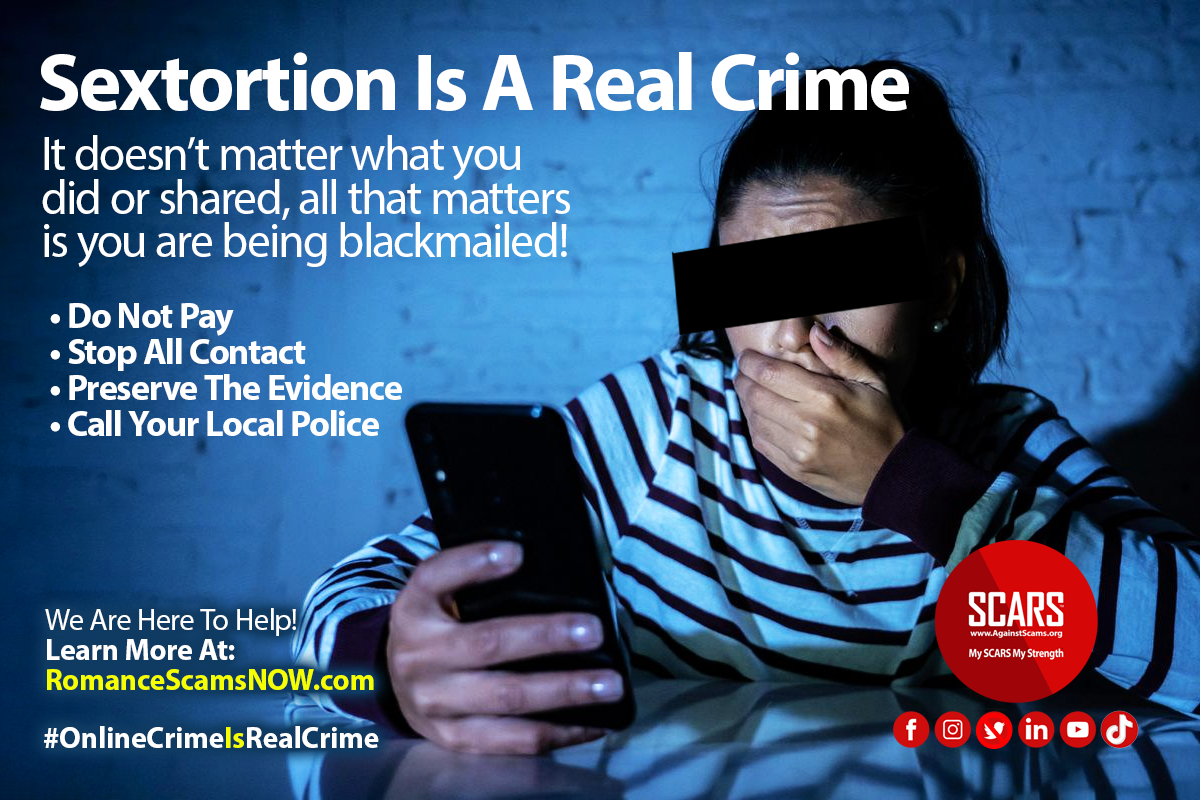Sextortion Is Exploding & Deep Fakes Are Making It Much Worse!
Malicious Actors Manipulating Photos and Videos to Create Explicit Content and Sextortion Schemes
The FBI is warning the public of criminals creating synthetic content (commonly referred to as “deepfakes”) by manipulating benign photographs or videos to target victims in Sextortion Scams.
Technology advancements are continuously improving the quality, customizability, and accessibility of artificial intelligence (AI)-enabled content creation. The FBI continues to receive reports from victims, including minor children and non-consenting adults, whose photos or videos were altered into explicit content. The photos or videos are then publicly circulated on social media or pornographic websites, for the purpose of harassing victims or sextortion schemes.
Introduction To Sextortion
Sextortion is a form of cybercrime in which the perpetrator threatens to release sexually explicit photos or videos of the victim, obtained through coercion or deception if the victim does not provide money, goods, or other favors. Sextortion can be devastating to victims, who may experience humiliation, anxiety, and depression. In some cases, victims have even committed suicide.
Sextortion can occur in a variety of ways. In one common scenario, the perpetrator will pose as someone else, such as a friend or romantic partner, and trick the victim into sending them explicit photos or videos. Once the perpetrator has the photos or videos, they will threaten to release them if the victim does not cooperate with their demands.
In other cases, the perpetrator will use malware or other hacking techniques to gain access to the victim’s computer or phone. Once they have access, they can steal the victim’s personal information, including their contact information, passwords, and credit card numbers. They can then use this information to blackmail the victim or to commit other crimes.
This is especially effective against teens and young adults!
Explicit Content Creation – How It Works
- Malicious actors use content manipulation technologies and services to exploit photos and videos for Sextortion Scams — typically captured from an individual’s social media account, open internet, or requested from the victim—into sexually-themed images that appear true-to-life in likeness to a victim, then circulate them on social media, public forums, or pornographic websites.
- Many victims, which have included minors, are unaware their images were copied, manipulated, and circulated until it was brought to their attention by someone else.
- The photos are then sent directly to the victims by criminals for sextortion or harassment, or until it was self-discovered on the internet.
- Once circulated, victims can face significant challenges in preventing the continual sharing of manipulated content or removal from the internet.
Sextortion and Harassment
Sextortion, which violates several federal & state criminal statutes in the United States (and in many other countries,) involves coercing victims into providing sexually explicit photos or videos of themselves, then threatening to share them publicly or with the victim’s family and friends. The key motivators for this are a desire for more illicit content, financial gain, or bullying and harassing others. Criminals have used manipulated photos or videos with the purpose of extorting victims for ransom or to gain compliance with other demands (e.g., sending nude photos).
As of April 2023, the FBI has observed an increase in sextortion victims reporting the use of fake images or videos created from content posted on their social media sites or web postings, provided to the malicious actor upon request, or captured during video chats.
Based on recent victim reporting, the criminals typically demanded:
- Payment (e.g., money, gift cards) with threats to share the images or videos with family members or social media friends if funds were not received; or
- The victim sends real sexually-themed images or videos.
FBI Sextortion Recommendations
The FBI urges the public to exercise caution when posting or direct messaging personal photos, videos, and identifying information on social media, dating apps, and other online sites. Although seemingly innocuous when posted or shared, the images and videos can provide criminals an abundant supply of content to exploit for criminal activity. Advancements in content creation technology and accessible personal images online present new opportunities for criminals to find and target victims. This leaves them vulnerable to embarrassment, harassment, sextortion/extortion, financial loss, or continued long-term re-victimization.
The FBI recommends the public consider the following when sharing content (e.g., photos and videos) or engaging with individuals online:
- Monitor children’s online activity and discuss risks associated with sharing personal content
-
Use discretion when posting images, videos, and personal content online, particularly those that include children or their information.
- Images, videos, or personal information posted online can be captured, manipulated, and distributed by criminals without your knowledge or consent.
- Once content is shared on the internet, it can be extremely difficult, if not impossible, to remove it once it is circulated or posted by other parties.
- Run frequent online searches of your and your children’s information (e.g., full name, address, phone number, etc.) to help identify the exposure and spread of personal information on the internet.
- Apply privacy settings on social media accounts—including setting profiles and your friends lists as private—to limit the public exposure of your photos, videos, and other personal information.
- Consider using reverse image search engines to locate any photos or videos that have circulated on the internet without your knowledge.
- Exercise caution when accepting friend requests, communicating, engaging in video conversations, or sending images to individuals you do not know personally. Be especially wary of individuals who immediately ask or pressure you to provide them. Those items could be screen-captured, recorded, manipulated, shared without your knowledge or consent, and used to exploit you or someone you know.
- Do not provide any unknown or unfamiliar individuals with money or other items of value. Complying with criminals does not guarantee your sensitive photos or content will not be shared.
- Use discretion when interacting with known individuals online who appear to be acting outside their normal pattern of behavior. Criminals take over social media accounts and can easily manipulate them to gain trust from friends or contacts to further criminal schemes or activity.
- Secure social media and other online accounts using complex passwords or passphrases and multi-factor authentication.
- Research the privacy, data sharing, and data retention policies of social media platforms, apps, and websites before uploading and sharing images, videos, or other personal content.
What To Do?
If you are a victim of sextortion, there are a few things you can do. First, do not give in to the perpetrator’s demands. This will only encourage them to continue their behavior. Second, report the crime to the police. The police may be able to track down the perpetrator and bring them to justice. Finally, seek help from a mental health professional. The emotional trauma of being a victim of sextortion can be significant, and it is important to get help if you are struggling.
Here are some tips to help protect yourself from sextortion:
- Be careful about what information you share online. Do not share your personal information, such as your address, phone number, or social security number, with people you do not know well.
- Be suspicious of emails or messages from people you do not know. If an email or message seems too good to be true, it probably is.
- Do not click on links in emails or messages from people you do not know. These links may lead to malicious websites that can infect your computer with malware.
- Keep your software up to date. Software updates often include security patches that can help protect your computer from malware.
- Use strong passwords and change them regularly. Do not use the same password for multiple accounts.
- Be aware of the risks of using public Wi-Fi networks. These networks are not secure and can be used by hackers to steal your personal information.
- If you think you may have been a victim of sextortion, report it to the police immediately.
Also, read the SCARS Guide to surviving sextortion: Surviving Sextortion / Sexual Photo Blackmail
More About Sextortion
- Surviving Sextortion / Sexual Photo Blackmail
- A Despicable New Sextortion Scam! Scamming The Parents Of Dead Children!
- When Sextortion Goes Wrong
- Sexting And Romance Scams ; A Path To Sextortion & Blackmail
- FBI Warns About Dangers of Sextortion [VIDEO]
- SCARS Insight: Avoid Teen Sextortion [VIDEO]
- Introduction To Sextortion Scams
- DeepFake Videos Are Now So Easy Any Scammer Can Do It!
Additional Resources
For more information on sextortion, see the 2 September 2021 PSA, “FBI Warns about an Increase in Sextortion Complaints,” at https://www.ic3.gov/media/Y2021/PSA210902.
Additionally, the below FBI press releases contain important information regarding this scheme:
- https://www.fbi.gov/news/press-releases/international-law-enforcement-agencies-issue-joint-warning-about-global-financial-sextortion-crisis
- https://www.fbi.gov/news/press-releases/fbi-and-partners-issue-national-public-safety-alert-on-financial-sextortion-schemes
The National Center for Missing and Exploited Children provides a free service known as Take It Down, which could help victims, who have possession of the image or video files, remove or stop the online sharing of nude, partially nude, or sexually explicit content that was taken while under 18 years old. For more information, visit https://takeitdown.ncmec.org.
If you believe you are the victim of a crime using these types of tactics, retain all information regarding the incident (e.g., usernames, email addresses, websites or names of platforms used for communication, photos, videos, etc.) and immediately report it to:
- FBI’s Internet Crime Complaint Center at www.ic3.gov
- FBI Field Office [www.fbi.gov/contact-us/field-offices or 1-800-CALL-FBI (225-5324)]
- National Center for Missing and Exploited Children [1-800-THE LOST or www.cybertipline.org]
Reporting these crimes can help law enforcement identify criminals and prevent further victimization.
-/ 30 /-
What do you think about this?
Please share your thoughts in a comment below!
Do You Need Support?
Get It Now!
SCARS provides the leading Support & Recovery program for relationship scam victims – completely FREE!
Our managed peer support groups allow victims to talk to other survivors and recover in the most experienced environment possible, for as long as they need. Recovery takes as long as it takes – we put no limits on our support!
SCARS is the most trusted support & education provider in the world. Our team is certified in trauma-informed care, grief counseling, and so much more!
To apply to join our groups visit support.AgainstScams.org
We also offer separate support groups for family & friends too.
Become a
SCARS STAR™ Member
SCARS offers memberships in our STAR program, which includes many benefits for a very low annual membership fee!
SCARS STAR Membership benefits include:
- FREE Counseling or Therapy Benefit from our partner BetterHelp.com
- Exclusive members-only content & publications
- Discounts on SCARS Self-Help Books Save
- And more!
To learn more about the SCARS STAR Membership visit membership.AgainstScams.org
To become a SCARS STAR Member right now visit join.AgainstScams.org
To Learn More Also Look At Our Article Catalogs
Scam & Crime Types
More SCARS
- ScamsNOW Magazine – ScamsNOW.com
- ContraEstafas.org
- ScammerPhotos.com
- AnyScam.com – reporting
- AgainstScams.org – SCARS Corporate Website
- SCARS YouTube Video Channel













![An Example of How Scammers Use Emergency Scams - 2014 [UPDATED 2024] - on SCARS RomanceScamsNOW.com](https://romancescamsnow.com/wp-content/uploads/2014/06/emergency-scams.png)

Please Leave A Comment - Tell Us What You Think About This!